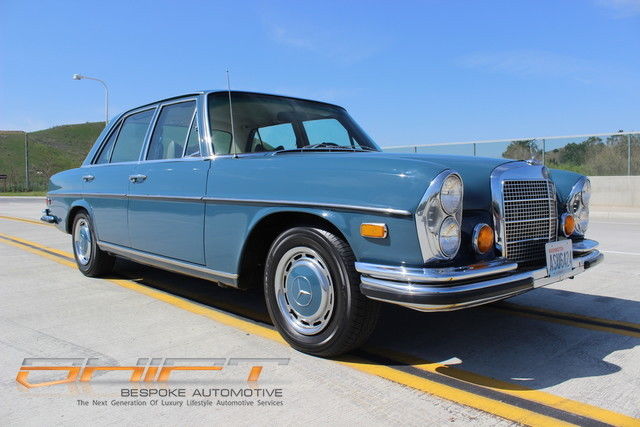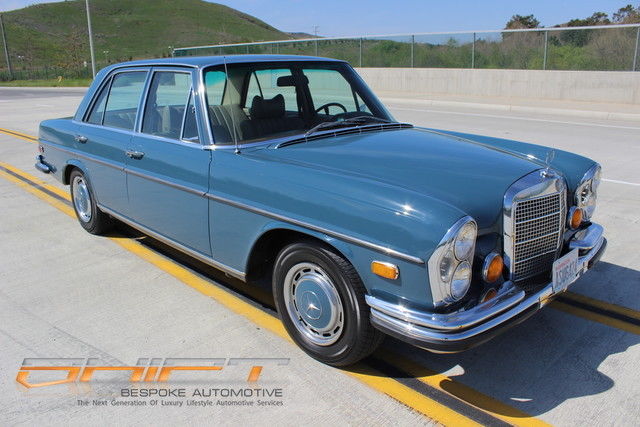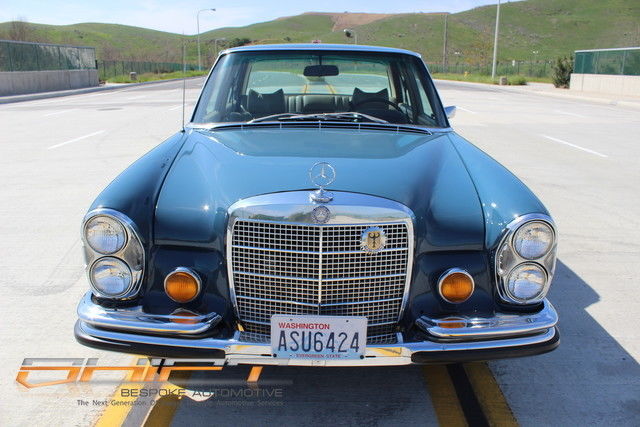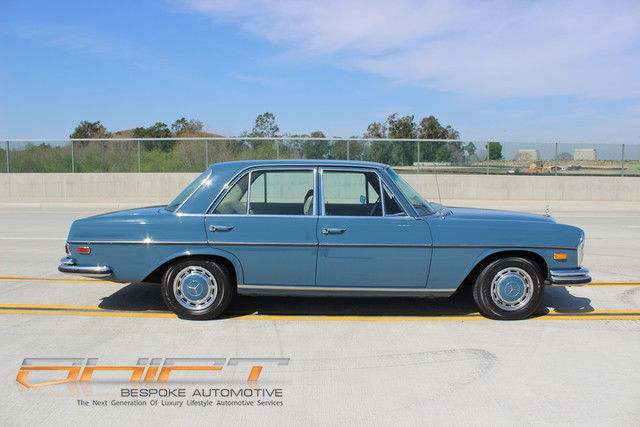1970 Mercedes-Benz SE
1970 Mercedes-Benz 200-Series SE
Mercedes-Benz 200-Series 1970 technical specifications | |
|---|---|
| Condition: | Used |
| Item location: | Laguna Hills, California, United States |
| Make: | Mercedes-Benz |
| Model: | 200-Series |
| SubModel: | SE |
| Type: | Sedan |
| Doors: | 4 |
| Year: | 1970 |
| Mileage: | 34,232 |
| VIN: | 10801812039026 |
| Color: | Blue |
| Fuel: | Gas |
| Transmission: | Automatic |
| Drivetrain: | Rear Wheel Drive |
| Interior color: | Gray |
| Vehicle Title: | Clear |
| You are interested? | Contact the seller! |
Description |
|---|
The Mercedes-Benz W108 and W109wereluxury carsproduced by Mercedes-Benzfrom 1965 through to 1972 and 1973 in North America only. The line was an update of the predecessor W111and W112fintailsedans. The cars were successful in West Germany and in export markets including North America and Southeast Asia. During the seven-year run, total of 383,361 units were manufactured.
The car's predecessor, he Mercedes-Benz W111(produced 1959–1971) helped Daimler develop greater sales and achieve economy of scaleproduction. Whereas in the 1950s, ercedes-Benz was producing hand-assembled300sand 300SLsalong with conveyor assembled Pontons (190, 90SL and 220) etc., he fintail(Germen: Heckflosse) family united the entire Mercedes-Benz range of vehicles onto one automobile platform, educing production time and costs. However, he design fashion of the early 1960s changed. For example, he tail fins, riginally intended to improve aerodynamic stability, ied out within a few years as a fashion accessory. By the time the 2-door coupe and cabriolet W111s were launched, he fins lost their chrome trim and sharp appearance, he arrival of the W113 Pagodain 1963 saw them further buried into the trunk's contour, nd finally disappeared on the W100 600in 1964.
The upgrade of the W111 began under the leadership of designer Paul Bracqin 1961 and ended in 1963. Although the fins' departure was the most visible change, he W108 compared to the W111 had a lower body waist line that increased the window area, the windscreen was 17 percent larger than W111). The cars had a lower ride (a decrease by 60mm) and wider doors (+15mm). The result was a visibly new car with a more sleek appearance and an open and spacious interior.
The suspension system featured a reinforced rear axle with hydro-pneumatic compensating spring. The car sat on larger wheels (14”) and had disc brakes on front and rear. The W109 was identical to the W108, ut featured an extended wheelbase of 115mm (4.5in) and self-levelling air suspension. This was seen as a successor to the W112 300SELthat was originally intended as an interim car between the 300 Adenauer(W189) and the 600 (W100) limousines. However, ts success as "premium flagship" convinced Daimler to add a LWB car to the model range. From that moment on, ll future S-Classmodels would feature a LWB line.
Although the W108 succeeded the W111 as a premium range full-size car, t did not replace it. Production of the W111 continued, owever the 230S was now downgraded to the mid-range series, he Mercedes-Benz W110, nd marketed as a flagship of that family until their production ceased in 1968. The W108 is popular with collectors and the most desirable models to collect are the early floor shift models with the classic round gear knob and the 300 SEL's.
During the winter of 1967/1968 Daimler launched its new generation family of vehicles, alled Stroke eight for the model year. The headline was the new W114 and W115family, uilt on a new chassis, ut the existing models were given an upgrade with a single engine, he 2778 cc M130.
The W108 now included 280S and 280SE, ith production starting in November 1967. These replaced the 250S, 50SE and 300SE, owever production of export-designated 250S would continue until March 1969. For the W109, he 300SEL finally retired the M189 engine, nd received the identical 2.8 M130. In January 1968, he model line was joined by yet another car, he 280SEL. The car had the longer wheelbase of the W109, ut lacked the pneumatic suspension and other features of the 300SEL. Hence the chassis code remained W108.
W111 or W112 cabriolet ( W108 and W109 were only available in 4 door guise. The W111 and W112 coupes and cabriolets are frequently mistaken for W108 or W109's)Performance on the cars improved. On the 280S the two downdraft carburettors produced 140hp (100kW) and could push the car to 185km/h (180 on auto), hilst 0-100 was done in 12.5 seconds. The fuel-injected delivered 160hp (120kW), nd featured a new pump which was not affected by temperature or altitude. Thanks to the air oil filter and better arrangement of cylinders, ooling and hence economy improved. Performance of the 280SE, 80SEL and 300SEL was all but identical, top speed of 190km/h (185 on auto) and a 0-100 acceleration in 10.5 seconds for the W108s, he W109 due to its larger weight, ook slightly longer, 2.2 seconds.
The W108/W109 vehicles carried over many of the basic engineering principles from previous models, ut had many refinements to make them some of the most well equipped cars of the era. The 300SE and 300SEL were especially well-appointed, eaturing burled walnut dashboards, utomatic transmission and power windows. The 300SEL 4.5 featured a sophisticated and advanced 4.5L V8 petrol engine, hich was carried over to the W116 S-class and R107 SL roadster, s was the smaller 3.5L unit.
The standard transmission for Europe was a four-speed manual gearbox. A four-speed automaticoption was also available. Unusual among mainstream European automakers of the time, ercedes developed and built their own automatic transmission system.For the six-cylinder models only, five-speed manual gearbox was also offered, rom 1969, hough few customers opted for it.
When the V8-engined cars were introduced in 1970, he default transmission was the four-speed automatic, riven via a fluid coupling rather than the more usual torque converter. Buyers could still opt for a four-speed manual box, owever, nd benefitted from a price reduction if they did so. The 4.5 litre version (offered from 1971 but only in the United States), as fitted with a three-speed automatic box with a torque converter. This engine/transmission combination became more widely available when incorporated in the successormodel.
We are please to offer for sale this fabulousexample of this great car. A subject of a meticulous ground up restoration almost 20 years ago, t still presents itself beautifully. A binder with all receipts accompanies this car, legendary vehicle, eady to be driven and enjoyed for many years to come!




 2006 MERCEDES BENZ CLK500 CABRIOLET POWER AND LUXURY IN A CLASSIC MERCEDES BENZ
2006 MERCEDES BENZ CLK500 CABRIOLET POWER AND LUXURY IN A CLASSIC MERCEDES BENZ
 2007 Mercedes-Benz Mercedes Benz SL65 AMG V12 Roadster Convertible BiTurbo
2007 Mercedes-Benz Mercedes Benz SL65 AMG V12 Roadster Convertible BiTurbo
 Original Mercedes Factory-ARMORED 2001 Mercedes Benz S500 SGUARD - LEVEL CEN B4
Original Mercedes Factory-ARMORED 2001 Mercedes Benz S500 SGUARD - LEVEL CEN B4
 1980 81 mercedes benz slc 380
1980 81 mercedes benz slc 380
 MERCEDES BENZ SLK230
MERCEDES BENZ SLK230
 1980 Mercedes Benz 240D
1980 Mercedes Benz 240D
 1967 MERCEDES-BENZ 250 SE Coupe
1967 MERCEDES-BENZ 250 SE Coupe
 1995 E320 Mercedes Benz
1995 E320 Mercedes Benz
 Mercedes Benz 1988 560SL
Mercedes Benz 1988 560SL
 1991 Mercedes Benz 300SL
1991 Mercedes Benz 300SL